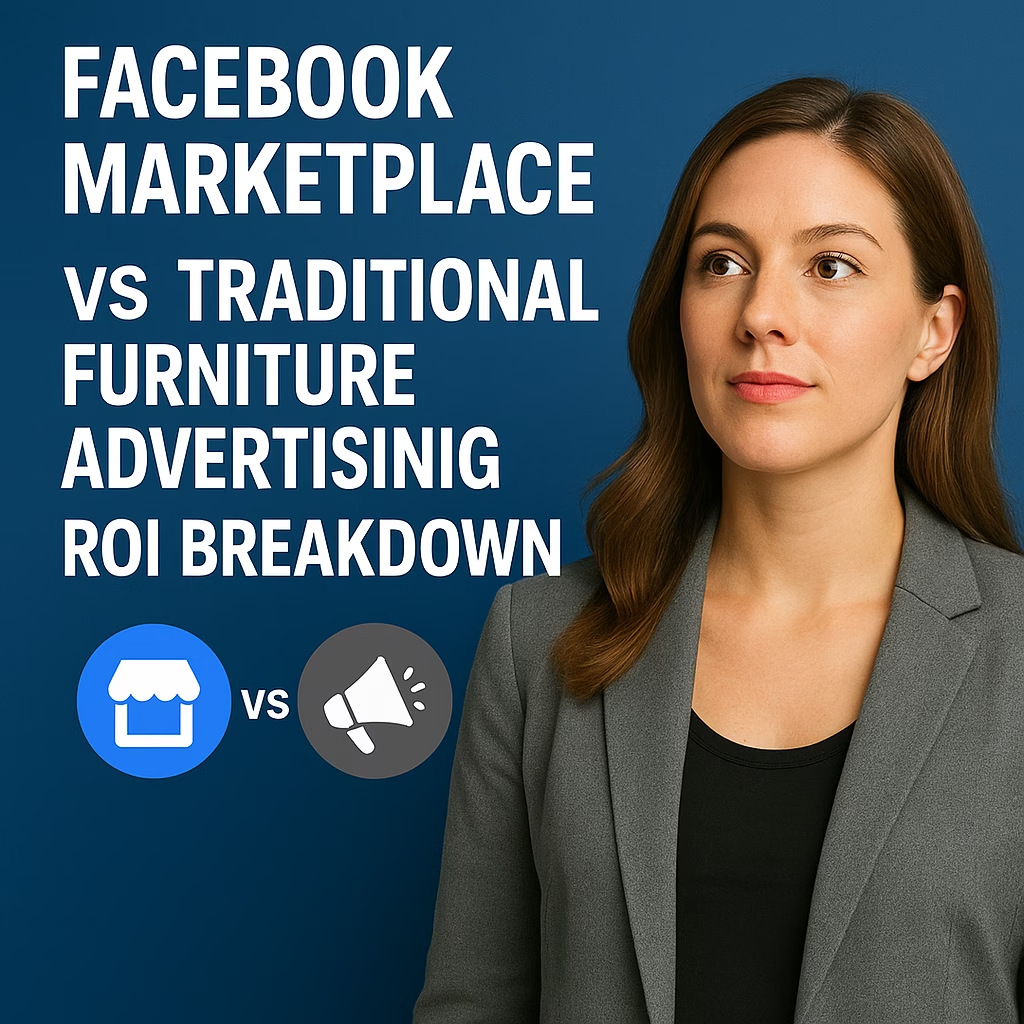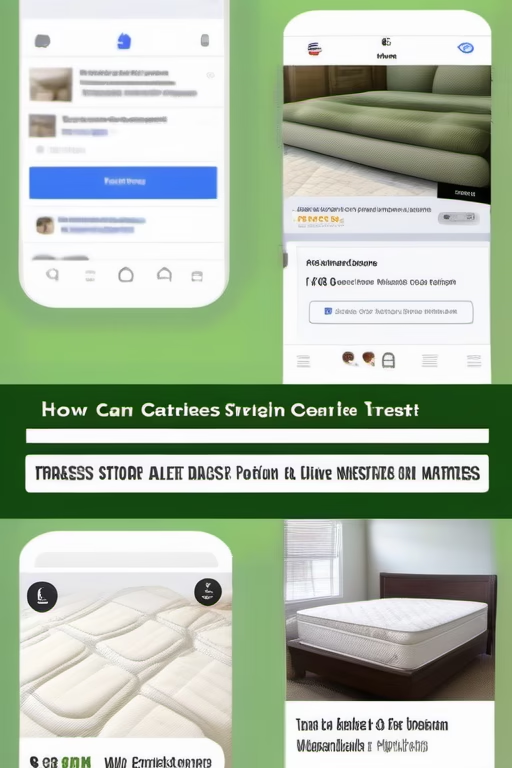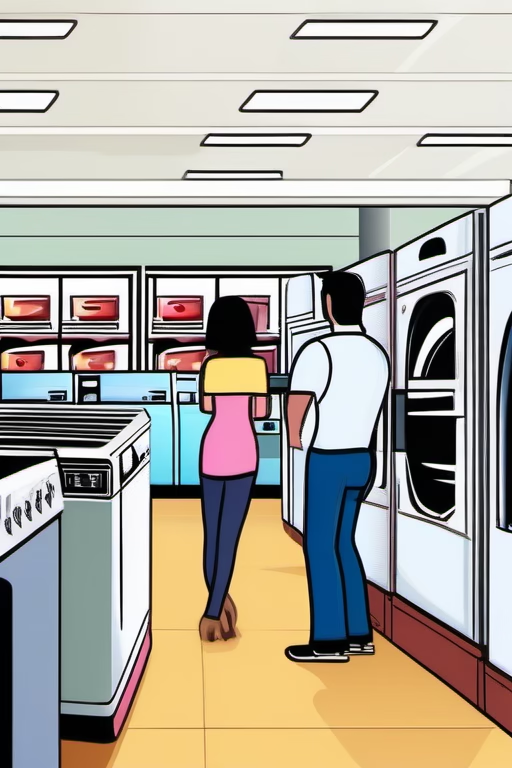Facebook Marketplace vs Traditional Furniture Advertising: ROI Breakdown
Cut through guesswork with a side-by-side comparison of costs, speed, and sales impact—so every dollar moves more couches.
Introduction
Facebook Marketplace vs Traditional Furniture Advertising: ROI Breakdown matters because furniture buyers behave differently in 2025: they search local, message instantly, and want delivery options now. Marketplace captures that intent in real time. Traditional channels—print, radio, billboards, and mailers—still have a role in brand lift. This guide shows how to blend both while measuring true return on investment.
Note: Numbers below are realistic examples for comparison. Your results may vary by market, photography, pricing, delivery, and response time.
Expanded Table of Contents
- 1) Channel Comparison at a Glance
- 2) Core Metrics: CPM • CPC • CPL • CAC • AOV
- 3) ROI Calculator (Worked Example)
- 4) Lead Quality, Speed, and Showroom Impact
- 5) Creative: Photos, Titles, and Offers that Move Inventory
- 6) Ops: Posting Cadence, Renewals, and Auto-Replies
- 7) Best Mix: When to Use Marketplace vs Traditional
- 8) Case Study: 42-Day Revamp → 3.1× Revenue/Ad Dollar
- 9) 30–60–90 Rollout Plan
- 10) Common Pitfalls & Fixes
- 11) 25 Frequently Asked Questions
- 12) 25 Extra Keywords
1) Channel Comparison at a Glance
| Factor | Facebook Marketplace | Traditional (Print/Radio/Mail/OOH) |
|---|---|---|
| Audience Intent | High: active local shoppers | Mixed: awareness + passive interest |
| Time-to-First-Message | Minutes to hours | Days to weeks |
| Granular Targeting | Local + category + search | Broad geo & demographics |
| Attribution | Strong (messages, UTMs) | Weaker (QR/unique phone) |
| Creative Requirements | Photo set + concise copy | Design/production cycles |
| Cost Predictability | Low cost per listing | Flat buys; higher entry cost |
| Scalability (SKUs) | High—post per item | Low—generic brand ads |
2) Core Metrics: CPM • CPC • CPL • CAC • AOV
Use the same scorecard for every channel so you can compare apples to apples:
Marketplace Benchmarks (Example)
- CPM (views per $): low
- CPL (per qualified message): $2–$12
- CAC (per sale): $15–$80
- AOV: $250–$1,200+
- Lead→Sale: 8–25% (photos + fast replies win)
Traditional Benchmarks (Example)
- CPM: mid–high (depends on market)
- CPL: $20–$100 (tracked via QR/codes)
- CAC: $120–$400+
- AOV: $400–$1,500 (showroom upsell)
- Lead→Sale: 3–10% (slower path)
3) ROI Calculator (Worked Example)
| Variable | Marketplace | Traditional |
|---|---|---|
| Monthly Spend | $600 | $3,000 |
| Qualified Leads | 120 | 60 |
| Lead→Sale | 15% | 7% |
| Sales Closed | 18 | 4.2 (~4) |
| AOV (after delivery) | $480 | $650 |
| Gross Revenue | $8,640 | $2,600 |
| Gross Margin (40% ex.) | $3,456 | $1,040 |
| Net After Ad Cost | $2,856 | -$1,960 |
| ROI | 4.76× | -0.65× |
Interpretation: With strong photos and quick replies, Marketplace often wins on speed and cost efficiency. Traditional can shine when paired with promotions and in-store events.
Quick formula: ROI = (Revenue × Margin − Ad Cost) ÷ Ad Cost
4) Lead Quality, Speed, and Showroom Impact
- Message intent: Marketplace buyers ask about size, color, delivery—clear purchase signals.
- Speed-to-reply: Aim for < 5 minutes with saved replies and calendar links.
- Showroom boost: Use Marketplace to book appointments; track walk-ins with a QR at the door.
5) Creative: Photos, Titles, and Offers that Move Inventory
| Element | Marketplace | Traditional |
|---|---|---|
| Hero Image | Square 1440×1440, chest-height angle | Brand photo or lifestyle collage |
| Proof | Dimensions card + defect honesty | Price drops, coupon codes |
| Offer | Delivery/pickup + bundle discount | Weekend sale, event, financing |
| CTA | “Message for delivery quote today” | “Bring this coupon for 10% off” |
6) Ops: Posting Cadence, Renewals, and Auto-Replies
- Post during peaks (Thu–Sun, 8–10am / 12–2pm / 6–9pm).
- Renew day 7 with a new first image or title variant.
- Use saved replies: size, color, delivery, price firmness, pickup windows.
- Route hot leads to a booking link; send delivery estimate templates.
7) Best Mix: When to Use Marketplace vs Traditional
Lean Inventory Turn
- 80% Marketplace posts
- 20% print/radio around holidays
Grand Openings / Big Sales
- 50% Marketplace (daily SKUs)
- 50% OOH/radio/DM for awareness
8) Case Study: 42-Day Revamp → 3.1× Revenue/Ad Dollar
A regional furniture outlet shifted budget from static print to Marketplace listings with appointment links. Results over 42 days: +212% messages, +168% booked pickups, delivery upsells on 37% of orders, and overall 3.1× revenue per ad dollar versus the prior month.
9) 30–60–90 Rollout Plan
Days 1–30 (Foundation)
- Shoot 10-shot photo sets for top SKUs
- Post 3–5 items at peak hours
- Turn on auto-replies + booking link
Days 31–60 (Momentum)
- Renew day-7; test titles
- Add delivery bundles and limited-time promos
- Source-level tracking (UTMs/QR)
Days 61–90 (Scale)
- Automate posting and reminders
- Roll seasonal campaigns across channels
- Weekly ROI dashboard by source
10) Common Pitfalls & Fixes
| Pitfall | Why It Hurts | Fix |
|---|---|---|
| Dark or cluttered photos | Low CTR, poor trust | Neutral wall, window light, 10-shot set |
| Slow replies | Intent decays in minutes | Auto-reply in <60s; saved FAQs |
| No tracking | Can’t prove ROI | Unique numbers/QR/UTM per channel |
| Over-posting | Flags and throttling | Drip schedule; renew weekly |
11) 25 Frequently Asked Questions
1) Is Marketplace enough on its own?
For many local sellers, yes—supplement with traditional around big events.
2) How many posts per week?
Start with 10–20 items across peak windows; renew weekly.
3) What’s a good response SLA?
< 5 minutes for first touch.
4) Do I list clearance first?
List hero SKUs first; use bundles to move clearance.
5) How to handle lowball offers?
Use prewritten counters and bundle incentives.
6) Delivery or pickup?
Offer both; include mapped pricing tiers.
7) Best photo count?
10–15 with dimensions and detail shots.
8) Should I watermark?
Small, bottom-right; don’t reduce CTR.
9) Can I repost daily?
Drip listings; renew weekly rather than spam.
10) What boosts conversions most?
Great photos + fast replies + delivery options.
11) How do I track store visits?
Front-desk QR + “How did you hear” field.
12) What’s acceptable CAC?
Lower than 20–25% of gross margin in most cases.
13) Do boosted posts help?
They can—test small budgets per hero SKU.
14) How to price used items?
Start 10–15% above target; be ready to negotiate.
15) Return policy?
State clearly in listing and messages.
16) Finance options?
Call out BNPL or store financing in copy.
17) Handling no-shows?
Confirmation + 24h/60m reminders + easy reschedule.
18) Photo background?
Neutral wall; avoid busy patterns.
19) SEO in titles?
Material + size + color + style.
20) Multi-city posting?
Follow platform rules; consider separate profiles per region.
21) Inventory sync?
Keep a live sheet; mark sold and renew remaining.
22) Peak days?
Thu–Sun; test locally.
23) First message template?
“Yes, available. Delivery today or tomorrow? ZIP for quote?”
24) How to avoid flags?
Correct categories, clear photos, unique variations.
25) First step today?
Post 3 hero SKUs at peak time with auto-replies on.
12) 25 Extra Keywords
- Facebook Marketplace vs Traditional Furniture Advertising: ROI Breakdown
- furniture advertising roi 2025
- marketplace vs print furniture
- radio vs social ads furniture
- billboard furniture store results
- direct mail furniture coupons
- craigslist vs facebook marketplace furniture
- local furniture lead generation
- furniture cpm cpc cpl cac
- furniture showroom traffic tracking
- marketplace posting cadence
- renew marketplace listings day 7
- furniture delivery conversion
- dimension card photo furniture
- bundle offer furniture sales
- bnpl furniture marketing
- qr code attribution retail
- utm tracking marketplace
- engagement velocity marketplace
- peak time furniture sales
- used furniture pricing strategy
- furniture lead response time
- store grand opening advertising
- multi channel furniture mix
- furniture retail 30 60 90 plan

















